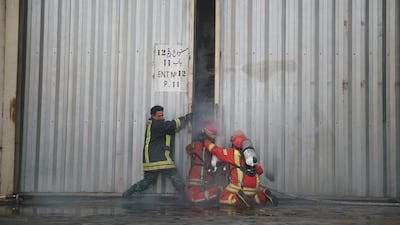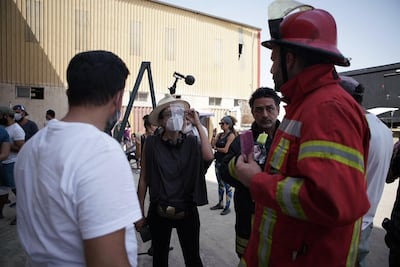A group of 15 Lebanese directors have come together to tell 15 stories about the Beirut blast that shook the capital on August 4.
Beirut 6:07, an anthology of short films with a running time of six to eight minutes each, will be broadcast on MBC's streaming platform Shahid VIP from Saturday, October 17. The project's title refers to the time the explosion occurred in the Lebanese capital.
All 15 films have been produced by Lebanese company IMagic Group's Big Picture Studios, in collaboration with FinalCut Equipped, MBC Group and Shahid VIP.
Lebanese director Mazen Fayad, who lives and works in Beirut, and is one of the people who helped get the project off the ground, says the idea came about organically as a reaction to capture some of the many stories from that tragic day. "It felt like a duty," he says.
Like thousands in the city, Fayad lost property – his two homes in Beirut and his office space in Karantina, were shattered in the blast.
"We all come from pain at different levels," he tells The National. "This [film] is my therapy."
Within a few weeks, 15 filmmakers set out to create 15 productions, each telling a unique story. It's a task, Fayad says, that felt almost impossible considering the circumstances on the ground.
His short, Abbas and Fadel, is a father-son story that is inspired by true events that took place on the day, and is set within the current political situation. The characters are played by real-life father and son Mohammad and Hassan Akil.

Another short in the series is 175, directed by Caroline Labaki, sister of Capernaum director Nadine.
The film follows the story of the firefighters who answered the call about the fire at the port and rushed to the scene minutes before the blast. It's named after the emergency number for the fire department in Lebanon. "It's really a personal take on what happened," Labaki, 42, tells The National.
"The firefighters' story was the one that touched me the most because these were the people who were going to help. These are the people we rely on and we failed them," she says.
Labaki, whose film stars Lebanese actress Zeina Makki and actor Wissam Saliba, says she also worked with real firefighters who acted and advised on production.
To write the script, Labaki, teamed up with her writing partner Tony Eli Kanaan, before heading into 10 days of production. "It was written from the heart," she says. "It's about these firefighters and for those firefighters." She says she felt a sense of responsibility towards them and their families. "All I wanted was to be as respectful as I could."
Labaki, whose house is in Gemmayzeh, recalls walking almost in disbelief into her destroyed apartment after the blast. "The devastation before I even got to the house, the people, I can't describe it," she says.
"It's not because I care about the material thing, but somewhere, somehow, you have your whole life in this house. I mean in this house is where Nadine and I started working together. This is where [Nadine's film] Caramel was made. This is where I started living on my own when Nadine got married. It has all these memories."

Despite the powerful stories contained within the anthology, Beirut 6:07 received some criticism after its promotional trailer was released, with some taking to social media to say the production has come too soon after the tragic event.
Fayad disagrees. "We should not forget this," he says. "More stories have to be done. We need to speak about this. It's part of our healing.
"We got consent from every family whose story we tell. They thanked us for honouring their loved ones and for immortalising their memory, so my conscience is clear because our heart is in the right place."
Labaki says she took part in the project because she wants to continue to talk about Lebanon. "I won't stop there. This is the first project I have put out there. I'm going to put out other things. I am going to talk about it."
Labaki, who splits her time living in Los Angeles and Beirut, says her heart remains true to telling stories about Lebanon first. "I want to tell Lebanese stories. In everything I do, it's about Lebanon. That's what I know."
The director is currently in pre-production on her first feature film, also co-written with Kanaan, and which he stars in, although between the coronavirus pandemic and the Beirut blast, production dates have been pushed back.
Regardless of how Beirut 6:07 fares among viewers in the Middle East, we can't deny this: Lebanese directors, screenwriters and actors, despite the tragedy of August 4 and everything the country has been through since street protests erupted exactly a year ago this week, know how to press hard on their wounds (this time camera in hand) and tell their stories to the world. This is, without a doubt, the true Lebanese spirit.
Beirut 6:07 is broadcast on Shahid VIP from Saturday, October 17, with a new short screened every day.




